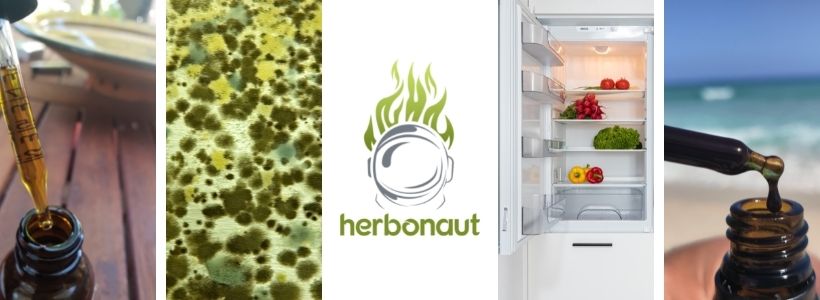
Maybe you have CBD oil in your closet that you bought 2 years ago.
Maybe your CBD oil passed its expiration date.
But can CBD oil even expire?
Short answer:
Yes, CBD oil can expire. But that doesn’t necessarily mean that your CBD oil is ‘bad’ after its expiration date.
Today you’re going to learn all the ins and outs about the shelf life of CBD oil.
Let’s get to it.
Table of contents:
How Long Does CBD Oil Stay Well After Expiration Date?
How Do You Tell If CBD Oil Is Expired?
What Happens If You Use Expired CBD Oil?
How to Store CBD Oil To Make it Last Longer?
How Long Does CBD Oil Last?
How long CBD oil officially lasts is decided by the manufacturer.
Generally, most manufacturers use an expiration date that’s 18 or 24 months after production.
But that doesn’t mean your CBD oil will turn rancid immediately after its official expiration date.
And it also doesn’t mean that your CBD oil can’t turn rancid before its official expiration date. Yes, if you don’t store your CBD oil well, it can turn bad even before its expiration date.
CBD oil is always made from a hemp extract or purified cannabinoid, plus an edible carrier oil like MCT oil.
Usually, the edible carrier oil makes up 70-90% of the oil. So how long CBD oil lasts, is highly dependent on how long the carrier oil inside it lasts.
Lipid oxidation is the main reaction responsible for reducing the shelf life of edible oils. This happens because lipid oxidation results in the the formation of toxic by-products.
Most CBD oils are made with MCT oil. In rare instances, they’re made with hemp seed oil or olive oil.
To understand what makes a CBD oil go bad, you have to understand what makes an edible oil like MCT oil oxidize. But you also have to understand what makes cannabinoids like CBD degrade.
Good for us is that:
What makes an edible oil oxidize and what makes cannabinoids like CBD degrade are similar. So if you prevent degradation of one, you prevent degradation of the other.
The elements that make edible oil and cannabinoids degrade are:
- light,
- heat, and,
- oxygen.
Depending on how often and how long your CBD oil gets exposed to these three elements, your CBD oil can degrade faster/slower than the official expiration date.
Generally, after opening, you should consume your CBD oil within 6-12 months.
This is because once air and oxygen has gotten inside the bottle, the degradation process speeds up. Plus, the chance of mold and bacteria growing inside the oil increase.
So as a general guideline, CBD oil stored in a sealed bottle, in a dark, cool place:
- lasts 18-24 months after its production date, and,
- lasts 6-12 months after opening the bottle, as long as this 6-12 months is before the expiration date.
How Long Does CBD Oil Stay Well After Expiration Date?
The safest recommendation is to throw away any CBD oil that’s passed its expiration date.
That said, after reviewing CBD products for 7+ years, we’ve come the the following conclusion:
If you store CBD oil in a cool, dark place, you can use it many months after its expiration date. How long exactly is dependent on various factors including:
- the extract type,
- the carrier oil,
- when exactly you opened the bottle, and,
- how often the bottle got exposed to light, heat, or air.
For example:
In our experience, a raw extract has a longer shelf life than distillate. This is probably because a raw extract has more tocopherols, polyphenols and phytosterols inside it. And some of these compounds prevent oxidative deterioration. Whereas a distillate type of product only has cannabinoids and/or terpenes. The only exception here is raw extracts that have chlorophyll. Chlorophyll isn’t good for shelf life of CBD oil.
Learn more about CBD extraction methods here.
When it comes to carrier oils, MCT oil and olive oil have a longer shelf life than hemp-seed oil.
The high content of polyunsaturated fatty acids (PUFAs) in hemp seed oil makes it more susceptible to lipid oxidation (1).
MCT oil doesn’t have PUFAs, it has medium-chain triglycerides, and these are a saturated type of fat. Saturated fats are more stable and less susceptible to oxidation than PUFAs (2).
Olive oil has way more monosaturated fatty acids (MUFAs) than PUFAs. And MUFAs are, again, more stable and less susceptible to oxidation than PUFAs.
Oxidation is one of the most important factors responsible for reducing oil quality and shelf life (3). So if your CBD oil has a carrier oil with MCT oil or olive oil, it may last a bit longer than a CBD oil with hempseed oil as the carrier oil.
How Do You Tell If CBD Oil Is Expired?
The CBD itself doesn’t really turn bad. CBD can degrade and lose potency. But it doesn’t turn rancid or into something toxic.
For example:
One study found that cannabis extract exposed to light at 22°C (71.6°F) resulted in an average loss of 4–5.5% CBD per year (4).
But an edible oil like MCT oil or hempseed oil can turn rancid. And ingesting rancid oil does have some health risks. So it’s important to know when a CBD oil is expired.
There are a few sense-related cues that can show that a CBD oil should probably be tossed away.
These cues include:
- color,
- smell, and,
- flavor.
If your CBD oil has a very different color than it had when you just opened it, it’s usually a bad sign. It can mean that the oil turned rancid. When the fatty acids inside your oil oxidize, it leads to change in color. It can also mean that bacteria or mold started growing inside the oil. Bacteria, mold and mycotoxins look a bit different though. You can clearly see something else is ‘living’ inside your oil.
When in doubt, just throw it away. Especially in the case of bacteria, mold, or mycotoxins, it’s not worth the risk. Ingesting these toxins can lead to unwanted side effects.
An example of a suspicious-looking CBD oil:
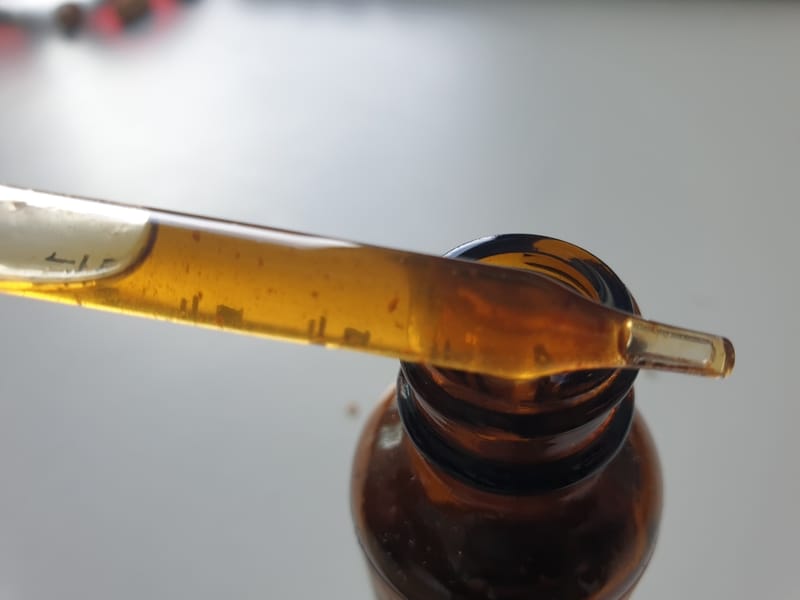
If your CBD oil smells very different than when you just opened it, it can also be a bad sign. Look out for a rancid sour, rotten smell. Keep in mind that if you have a raw extract, it has a different, more ‘earthy or’ ‘hempy’ smell than distillate type of oils. This natural smell doesn’t mean your oil is bad.
If your CBD oil tastes funny compared to when you just opened it, it can also be a sign that it’s time to toss your bottle away. If you don’t shake your bottle, before you use it, it can taste differently as well. Because different compounds have a different mass. The heavy compounds tend to concentrate on the bottom of the bottle. So make sure to always shake your bottle before you use it. That way, you won’t get surprised by a change in flavor caused by certain compounds concentrating on the bottom of the bottle.
Sometimes, the CBD inside a CBD oil crystalizes. This doesn’t mean it turned bad. But it can be difficult to dissolve this CBD, without heating the oil. And the problem with heating the oil is that you reduce its shelf life. That said, if you see very large crystals, it can definitely be worth it it to heat the oil so the CBD crystals dissolve. The more crystallized CBD inside your oil, the less potent your oil. Crystallized CBD doesn’t come with the drops of oil you drop under your tongue.
Example of how crystallized CBD oil can look:
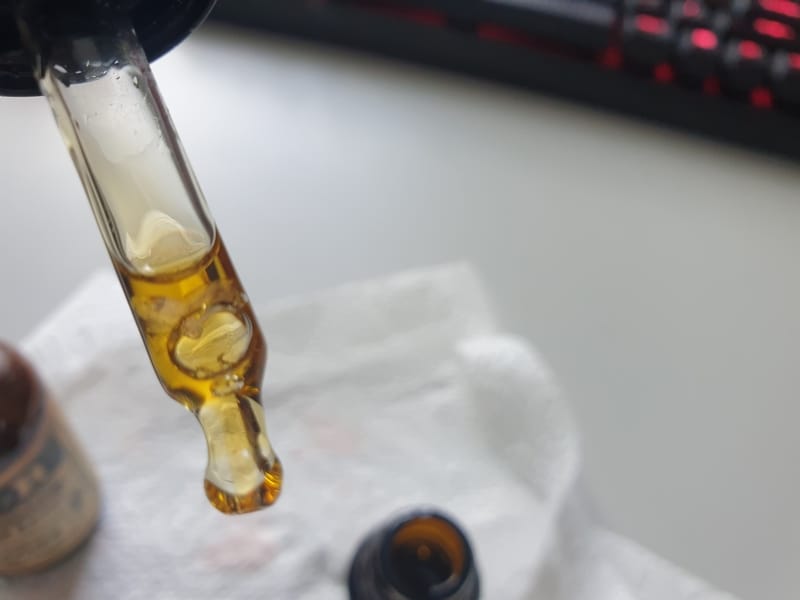
What Happens If You Use Expired CBD Oil?
What exactly happens when you used expired CBD oil depends on whether:
- the oil just lost a bit of potency,
- the oil turned rancid,
- bacteria, mold, and mycotoxins started growing inside it,
- or a combination of any of these.
Bacteria, mold, and mycotoxins are the biggest health risk. They can:
- heighten cancer risk,
- impair liver function,
- disturb healthy development of the fetus, and,
- mutate genes.
They can have these effects even in small concentrations.
So by taking CBD oil with bacteria, mold, and mycotoxins, as an immediate effect, you may get sick. As a long-term effect, you make increase your chance of various chronic diseases.
Ingesting rancid oil also comes with various health risks. Some of these health risks include a negative effect on hearth health and a pro-inflammatory effect.
If you ingest a CBD oil that just lost a bit of potency, nothing will happen. You’ll only feel less strong effects.
How to Store CBD Oil To Make it Last Longer?
CBD oil should always be stored in a dark and cool place. But also always inside a sealed bottle.
The less your CBD oil gets exposed to:
- light,
- air, and,
- heat,
the longer it will last.
Some CBD companies bottle their oil inside ultraviolet glass bottles. These are even better at blocking light than regular amber bottles.
Should you refrigerate CBD oil?
This depends on whether:
- your CBD oil has acidic cannabinoids like CBDA and CBGA, and,
- how warm the place is your planning to store your CBD oil.
Acidic cannabinoids like CBDA, CBGA, and THCA, slowly convert to their decarboxylated forms (CBD, CBG, and THC) at room temperature (5). So if you want to keep these acidic cannabinoids inside your oil, it’s best you refrigerate it.
If you can store your CBD oil at a temperature below 20°C/68°F, you don’t have to refrigerate it. After opening your bottle though, we always recommend refrigerating it. If you can’t store it below these temperatures, refrigerate your oil, even before opening it.
Other Ingredients That Influence CBD Oil’s Shelf-Life
If your CBD oil has other ingredients than hemp-extract and a carrier oil, you have to determine the shelf life of these other ingredients.
Some common ingredients other than hemp-extract and a carrier oil are:
- added vitamins,
- added herbal formulation,
- added flavors,
- added melatonin.
Vitamins lose potency after 1-2 years. But they don’t become toxic or dangerous to your health.
Herbs like turmeric last 2-3 years.
Natural flavorings don’t really turn bad either. If you have chemical flavorings, it can be different.
Melatonin can last anywhere between 1-3 years.
As you can see, most ingredients don’t shorten the shelf life of CBD oil.
But if your CBD oil contains other ingredients, always double-check to be sure.
Extract-type
As explained earlier, raw-extracts without chlorophyll generally last a bit longer than distillate products.
Raw extracts have cannabinoids, terpenes, but also many other plant compounds like:
- tocopherols,
- polyphenols, and,
- phytosterols.
These other compounds have a protective effect and prevent oxidation to a certain degree.
Example of how raw extract looks:
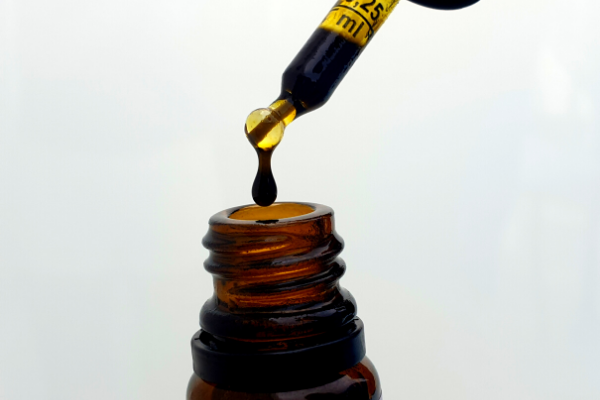
Distillate products are purified in a way that these other compounds are filtered out, and only cannabinoids and terpenes are left inside.
This leads to a better taste, but also makes the product a bit more susceptible to oxidation.
Example of how distillate extract looks:
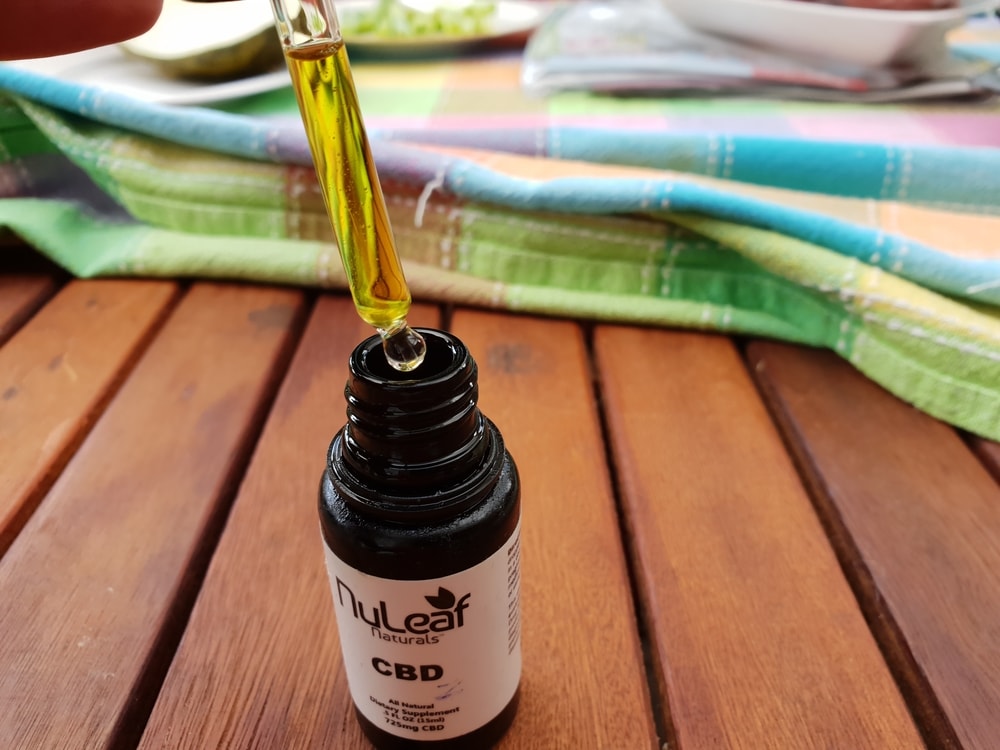
Most CBD products are distilled products. If you want a raw extract, you really have to look for it.
If you’re looking for a raw extract, you can check out our list of CBDA oils.
Conclusion
CBD oil can last anywhere between 6-24 months, depending on:
- how it’s stored (cool vs warm, dark vs light, airtight, vs open),
- when it was produced,
- how it was produced (is it a raw extract or a distillate product),
- what type of carrier oil is inside it,
- what other ingredients are inside it.
If you’re ever in doubt because your CBD oil smells, looks, or tastes funny…
Just toss it away.
Ingesting CBD together with mycotoxins, bacteria, mold, or rancid oil isn’t worth the health risk.
What’s Next…
Go to our CBD Hub to learn more about CBD-related topics.
References:
- Callaway, J.C.; Pate, D.W. Hempseed oil. In Gourmet and Health-Promoting Specialty Oils; AOCS PRESS: Urbana, IL, USA, 2009; pp. 185–213.
- National Research Council (US) Committee on Diet and Health. Diet and Health: Implications for Reducing Chronic Disease Risk. Washington (DC): National Academies Press (US); 1989. 7, Fats and Other Lipids. Available from: https://www.ncbi.nlm.nih.gov/books/NBK218759/
- Sharma, S., Cheng, S. F., Bhattacharya, B., & Chakkaravarthi, S. (2019). Efficacy of free and encapsulated natural antioxidants in oxidative stability of edible oil: Special emphasis on nanoemulsion-based encapsulation. Trends in Food Science & Technology, 91, 305–318. https://doi.org/10.1016/j.tifs.2019.07.030
- Trofin, I.G., Dabija, G., & Filipescu, L. (2012). The Influence of Long-term Storage Conditions on the Stability of Cannabinoids derived from Cannabis Resin.
- Pratap Singh, A., Fathordoobady, F., Guo, Y., Singh, A., & Kitts, D. D. (2020). Antioxidants help favorably regulate the kinetics of lipid peroxidation, polyunsaturated fatty acids degradation and acidic cannabinoids decarboxylation in hempseed oil. Scientific Reports, 10(1). https://doi.org/10.1038/s41598-020-67267-0